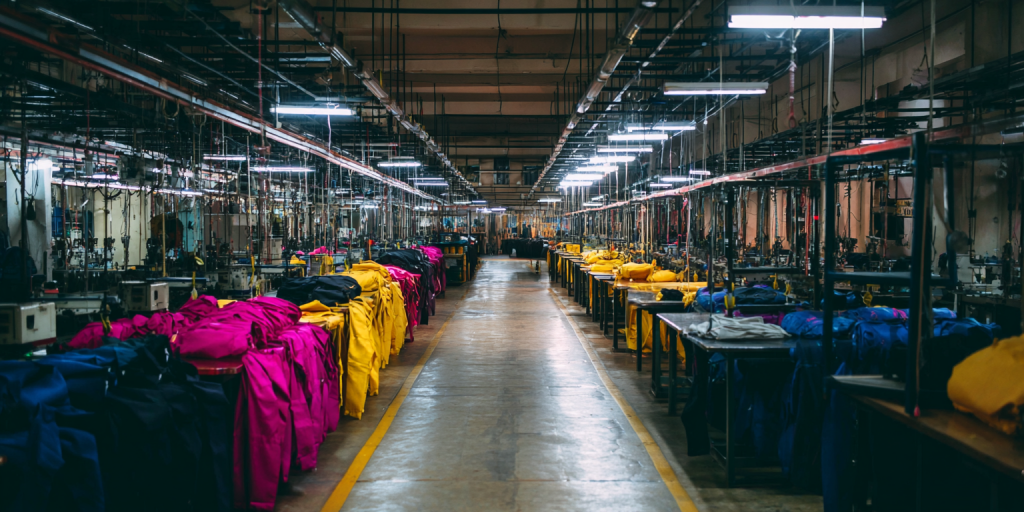
Content Menu
● Understanding Prototyping in Apparel
● The Apparel Production Platform: An Overview
● Key Benefits of Using an Apparel Production Platform for Prototyping
>> Accelerated Product Development
>> Improved Quality and Consistency
● Technical Features That Drive Success
● Supply Chain Insights: From Concept to Consumer
● Product Development Expertise: Leveraging Digital Tools
● Scaling and Customization for Growing Brands
● Conclusion: Take the Next Step in Apparel Innovation
>> 1. What is an Apparel Production Platform?
>> 2. How does an Apparel Production Platform improve prototyping?
>> 3. Can an Apparel Production Platform help with supply chain management?
>> 4. What technical features should I look for in an Apparel Production Platform?
>> 5. Is an Apparel Production Platform suitable for small brands or startups?
The journey from an initial clothing concept to a finished product on the retail shelf is complex, especially for newcomers to the apparel industry. One of the most critical stages in this process is prototyping—a phase where ideas take physical form, allowing brands to test, refine, and perfect their designs before mass production. In today’s fast-paced, digitally driven market, an Apparel Production Platform is an indispensable tool for streamlining prototyping, optimizing supply chains, and ensuring successful product development.
This article explores how an Apparel Production Platform empowers beginners and established brands alike to navigate the intricacies of prototyping, manage technical and logistical challenges, and accelerate time-to-market with confidence and efficiency.

Prototyping is the process of transforming a design concept into a tangible garment sample. It is a critical step in apparel product development, serving as the bridge between creative vision and large-scale manufacturing. The prototyping process typically involves:
– Conceptualization: Designing and specifying garment details, such as fabric, trims, and intended fit.
– Pattern Making: Creating technical patterns that serve as blueprints for construction.
– Sample Creation: Producing the first physical sample, often using cost-effective materials.
– Fitting and Adjustment: Evaluating the sample on models, making necessary adjustments for fit and functionality.
– Final Prototype: Developing a production-ready sample using actual materials and construction methods.
– Approval and Production: Securing sign-off from all stakeholders before moving to mass production.
Prototyping allows brands to identify design flaws, ensure garments fit comfortably, and refine aesthetic elements before committing to large-scale manufacturing.
For beginners, prototyping can be a daunting process due to the many technical and logistical challenges involved. Without the right systems in place, it’s easy to face delays, miscommunication, and costly errors. This is where an Apparel Production Platform becomes a game-changer, providing a structured, transparent, and efficient approach to managing prototypes.
An Apparel Production Platform is a digital ecosystem designed to manage every aspect of apparel manufacturing, from initial design to finished product. These platforms integrate various modules and tools to streamline processes, enhance collaboration, and provide real-time visibility across the supply chain.
Key components of an Apparel Production Platform include:
– Product Lifecycle Management (PLM): Centralizes all product-related data, from design sketches to technical specifications, ensuring consistency and accuracy.
– Supply Chain Management: Tracks raw materials, vendor performance, and production schedules to optimize procurement and manufacturing.
– Inventory and Order Management: Monitors stock levels, manages purchase orders, and coordinates shipments.
– Quality Control: Implements checkpoints throughout production to maintain standards and reduce defects.
– Vendor and Compliance Management: Ensures suppliers meet regulatory and ethical standards.
– Digital Prototyping Tools: Enables virtual sampling and design visualization to reduce physical sample iterations.
By centralizing data and workflows, an Apparel Production Platform enables brands to coordinate teams, manage technical details, and maintain control over every stage of product development.
Speed to market is a critical competitive advantage in the fashion industry. Apparel Production Platforms enable faster transitions from concept to prototype by automating repetitive tasks, centralizing communication, and providing real-time status updates. This reduces lead times, allowing brands to respond quickly to market trends and consumer demands.
For example, automated tech pack generation eliminates manual errors and accelerates the handoff between design and production teams. Digital sample tracking ensures that feedback loops are closed promptly, preventing delays caused by lost information or miscommunication.
Prototyping involves multiple stakeholders—designers, pattern makers, manufacturers, quality inspectors, and buyers. An Apparel Production Platform provides a shared digital workspace where all parties can access the latest files, comment on samples, and track changes in real time.
This level of collaboration is especially valuable for brands working with international suppliers or remote teams. It reduces the risk of costly misunderstandings and ensures that everyone is aligned on project goals and timelines.
Quality control is paramount in prototyping to avoid costly mistakes during production. Apparel Production Platforms integrate quality checkpoints and digital inspection forms that capture deviations early in the process.
Moreover, by maintaining a centralized database of approved samples, materials, and supplier certifications, brands can ensure consistency across multiple production runs and collections. This traceability is essential for building consumer trust and meeting regulatory requirements.
An Apparel Production Platform provides end-to-end visibility, from raw material sourcing to final delivery. Brands can track inventory, manage suppliers, and anticipate bottlenecks, ensuring a smooth and transparent supply chain.
For prototyping, this means that materials required for samples are ordered on time, vendors are held accountable for deadlines, and any potential disruptions are flagged early. Supply chain transparency also supports sustainability initiatives by enabling brands to monitor the environmental and social impact of their sourcing decisions.
Prototyping can be expensive, especially when multiple iterations are required. By reducing errors, minimizing waste, and optimizing resource allocation, Apparel Production Platforms help brands control costs throughout the prototyping and production process.
Automated costing modules analyze material usage, labor, and overhead to provide accurate cost estimates for each prototype. This data-driven approach enables brands to make smarter decisions about design modifications and production methods, ultimately maximizing profitability.

Modern Apparel Production Platforms are packed with features tailored to the unique needs of the fashion industry:
– Automated Bill of Materials (BOM) Creation: Instantly generate BOMs from garment specifications, supporting precise material planning and procurement. This reduces manual data entry errors and accelerates purchasing.
– Style-Color-Size Matrix Management: Efficiently handle thousands of SKU variants, ideal for brands with diverse collections and complex assortments.
– Barcode and RFID Inventory Tracking: Real-time, multi-warehouse inventory management for accurate stock control and traceability. This ensures prototype materials are available when needed and reduces stockouts.
– Integrated Vendor Portals: Streamline communication with suppliers, track job work, and manage outsourcing with transparency. Vendors can update order status and upload quality reports directly into the platform.
– Mobile Access and Cloud Integration: Enable on-the-go decision-making and remote team collaboration through secure cloud platforms. This flexibility supports agile workflows and rapid response to issues.
– Digital Prototyping and 3D Design: Create virtual samples to reduce the need for costly physical prototypes, speeding up the approval process. 3D visualization also helps stakeholders better understand fit, drape, and aesthetics before committing resources.
These features not only streamline operations but also empower brands to innovate confidently and scale efficiently.
The apparel supply chain is a complex network involving designers, pattern makers, manufacturers, logistics providers, and retailers. An Apparel Production Platform brings order and transparency to this network by:
– Centralizing Data: All supply chain activities are tracked in one system, from material sourcing to order fulfillment. This eliminates fragmented spreadsheets and email chains.
– Optimizing Inventory: Automated reordering and allocation prevent shortages and overstock, reducing waste and improving cash flow. For prototyping, this ensures that sample materials are available without excess inventory buildup.
– Enhancing Compliance: Built-in compliance modules help brands adhere to industry regulations and quality standards, reducing the risk of costly recalls or fines. This is especially important for sustainable and ethical sourcing certifications.
– Supporting Omnichannel Distribution: Integrated order management ensures seamless fulfillment across B2B, retail, and e-commerce channels. This flexibility allows brands to test prototypes in multiple markets before scaling.
With real-time analytics and reporting, brands can monitor supply chain performance, identify trends, and make informed decisions to stay competitive in a rapidly changing market.
Successful apparel product development requires more than creativity—it demands technical expertise, meticulous planning, and robust project management. An Apparel Production Platform supports each phase of product development:
– Idea Generation and Concept Development: Capture inspiration, conduct market research, and develop mood boards within the platform. Centralized idea management helps prioritize concepts based on feasibility and market potential.
– Design and Technical Planning: Create detailed tech packs, manage pattern development, and specify materials with precision. Digital tech packs reduce errors and ensure manufacturers have clear instructions.
– Sample Production and Testing: Coordinate sample creation, schedule fittings, and collect feedback for iterative improvements. Digital workflows track sample status and approval history.
– Testing and Validation: Use digital tools to simulate wear, assess fit, and validate design choices before physical sampling. This reduces the number of costly physical prototypes.
– Final Manufacturing and Launch: Manage production timelines, quality control, and logistics to ensure on-time delivery and successful market entry. Integrated dashboards provide visibility into all critical milestones.
By leveraging these tools, brands can reduce risk, improve product quality, and accelerate their path from concept to consumer.
As brands grow, their product lines become more complex, requiring scalable solutions. An Apparel Production Platform is designed to grow with your business:
– Customizable Workflows: Tailor processes to fit your unique product development cycle, whether you focus on fast fashion, sustainable apparel, or luxury garments.
– Multi-Brand and Multi-Location Support: Manage several brands or production sites within a single platform, consolidating reporting and reducing administrative overhead.
– Advanced Analytics and Forecasting: Use historical data and AI-driven insights to predict demand, optimize inventory, and plan future collections more accurately.
– Integration with ERP and CRM Systems: Seamlessly connect your Apparel Production Platform with enterprise resource planning and customer relationship management tools for unified operations.
This flexibility ensures that your prototyping and production processes remain efficient and aligned with your evolving business goals.
In the competitive world of fashion, speed, quality, and innovation are non-negotiable. For beginners and established brands alike, mastering the prototyping process is essential for success. An Apparel Production Platform offers the digital backbone needed to streamline prototyping, enhance collaboration, and optimize the entire supply chain.
Whether you’re launching your first collection or scaling an established brand, investing in a robust Apparel Production Platform will empower you to bring your creative visions to life with efficiency and confidence.
Ready to transform your apparel business? Contact us today to schedule a personalized demo and discover how our Apparel Production Platform can help you accelerate product development, improve quality, and achieve sustainable growth.

An Apparel Production Platform is a comprehensive digital system that manages all aspects of apparel manufacturing, from design and prototyping to inventory, supply chain, and quality control. It centralizes data, automates workflows, and enhances collaboration across teams and partners.
By integrating digital prototyping tools, automated sample tracking, and real-time collaboration features, the platform streamlines the creation, testing, and refinement of prototypes. This reduces lead times and ensures higher quality samples.
Yes, it provides end-to-end visibility and control over the entire supply chain. Brands can track raw materials, manage suppliers, monitor production progress, and optimize logistics, resulting in reduced costs and improved delivery performance.
Key features include automated BOM creation, style-color-size matrix management, barcode/RFID inventory tracking, vendor portals, mobile/cloud access, and digital prototyping capabilities. These features support efficient, scalable, and transparent operations.
Absolutely. Modern platforms are scalable and customizable, making them ideal for businesses of all sizes. They help startups streamline operations, reduce errors, and bring products to market faster with fewer resources.
Hot tags: Fashion Prototyping Tools, Garment Sample Creation, Clothing Development Platform, Prototype Management Software, Apparel Testing Solutions, Fashion Design Samples, Online Clothing Prototyping, Apparel Mockup Tools, Sample Making for Startups, Digital Prototype Tools